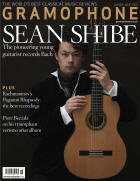Texte paru dans: / Appeared in: |
|
|
Outil de traduction (Très approximatif) |
|
|
Reviewer:
Lindsay Kemp This really does look like two recordings on one disc. The works it presents are so radically different in style, tone and scoring that it is hard to imagine circumstances in which one would want to hear the two of them together. And that includes Maundy Thursday, for which they were both written. But perhaps that isn’t the point. Couperin’s divine Leçons de Ténèbres – quietly profound settings of the Lamentations for one and two voices with continuo – are true masterpieces of Baroque church music, the subject of over two dozen recordings reaching back to the 1930s. Some have focused on the music’s unutterable melodic beauty, others on conveying matters of text, and this one favours the former, making good use of two well-matched sopranos with classically attractive, English-style voices. Indeed, though French Latin pronunciation is used, some listeners may wish for a fruitier colouring to the vowels. Julia Doyle, singing the first leçon, shows a good grasp of the music’s expressive workings, leaning ardently on its aching dissonances but refraining from histrionics; surprisingly, she seems to take more breaths than usual in these pieces. Grace Davidson in the second does less with the words but is more fluid and pacy, and her voice floats more gratefully on the air. When the two combine in the third leçon they seem to egg each other on to raise the expressive stakes a little; but overall these performances are what one might call coolly beautiful. By the time you have listened to Gesualdo’s Tenebrae Responsories, Couperin’s exquisitely composed world will seem far away. Even for a madrigalist known for his extreme use of dissonance, this is extraordinary stuff, playing out Jesus’s betrayal in tortured, jagged music that in places is almost too painful to listen to. The singing of six members of Tenebrae (Doyle and Davidson the sopranos) is accomplished, snappy and defined, with firm control of changing dynamics. Nigel Short shows a strong sense of mannerist storytelling, using the text as a spur to action and unafraid to assault the ear when things get chromatically heated; the way the words sometimes shout into the silence of the church is immensely powerful. This is angry, compelling music, not to be mistaken for easy background polyphony. |
|




